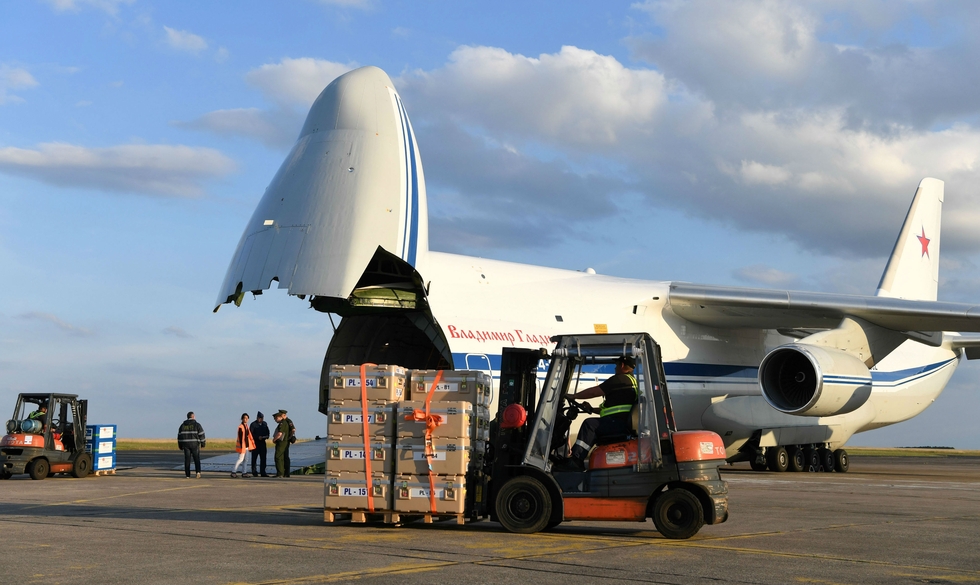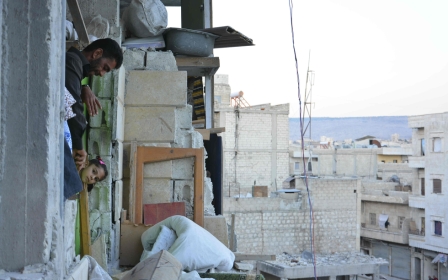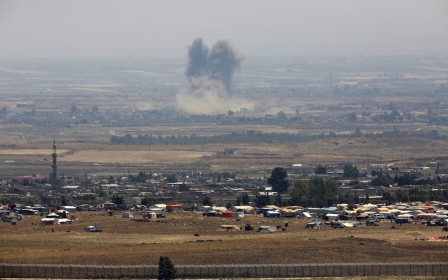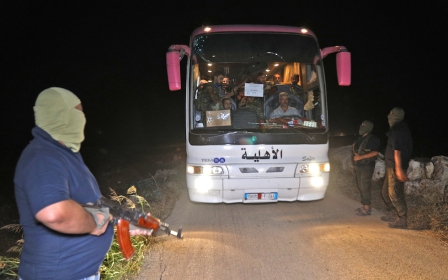French and Russian humanitarian aid arrives in Syria's ravaged Eastern Ghouta

Humanitarian aid sent by France and Russia has arrived in Syria as the two countries' leaders discussed a joint mission to distribute much-needed relief supplies in the ravaged former rebel enclave of Eastern Ghouta.
The joint humanitarian aid operation, the first between Russia and a Western country, was originally agreed by Russian President Vladimir Putin and French leader Emmanuel Macron during talks in Saint Petersburg in May.
A Russian Antonov-124 Ruslan military cargo plane carrying more than 40 tonnes of medical aid and humanitarian supplies arrived on Saturday at the Russian military base in Hmeimim after departing from the central French city of Chateauroux earlier in the day, the Russian defence ministry said.
The aid, including medicine, medical equipment, clothes and tents, will be given to residents of Eastern Ghouta on the fringes of the capital Damascus, which was retaken by government forces in April after a five-year siege.
It will be distributed under the supervision of the UN's Office for the Coordination of Humanitarian Aid (OCHA).
Russian representatives and the Syrian Arab Red Crescent will also participate in the process.
The supplies will also be distributed to hospitals run by the Red Crescent, Moscow said.
On Saturday, Putin and Macron discussed "humanitarian aspects of the Syria settlement" including the joint mission "to render assistance to the population of Eastern Ghouta" and other international issues, the Kremlin said.
Undertaken as part of a UN Security Council resolution, "the aim of this project is to enable civilian populations better access to aid," a joint Franco-Russian statement said earlier.
"Humanitarian assistance is an absolute priority and must be distributed in accordance with principles of humanity, neutrality, impartiality and independence across all Syrian territory without exception," it added.
France had secured "guarantees" from Russia that the Syrian regime would not obstruct the distribution of the aid, and that it would not be misappropriated or used for political purposes, the foreign ministry said.
'Considerable risks'
Some observers have asked if it was wise for France to cooperate with Russia.
"We cannot be against humanitarian assistance but France is taking considerable risks by working with Russia and the Syrian Red Crescent," tweeted former French ambassador to Syria Michel Duclos.
"What mechanisms guarantee that this aid will not be diverted or exploited by [Syrian President Bashar al-] Assad for political purposes?" said Duclos, an analyst at the Institut Montaigne in Paris.
The Russian defence ministry insisted that the aid would be distributed in accordance with "international humanitarian law".
More than 1,700 civilians were killed during the Syrian regime's operation in Eastern Ghouta in March and April.
According to the Russian military, more than 160,000 people, both military and civilians, were evacuated from the region.
The medical aid is aimed at some 500 people who have been seriously injured and the 15,000 others who have received lighter injuries during the fighting in Eastern Ghouta.
Russia-US cooperation
In other developments, Moscow has put forward plans to Washington to cooperate on the safe return of refugees to Syria, the Russian Ministry of Defence said on Friday, days after a summit between Presidents Putin and Donald Trump.
"Specific proposals on how work could be organised to ensure that refugees can return home have been sent to the American side," General Mikhail Mizintsev, a senior ministry official, said in a statement.
The proposals "take into account the agreements reached by the Russian and American presidents during their meeting in Helsinki" on Monday, he said.
Trump and Putin announced they had reached several points of an agreement following their first bilateral summit in the Finnish capital, but did not provide further details.
US Secretary of State Mike Pompeo also confirmed on Friday this had been part of the presidents' talks.
Syria's conflict has killed more than 350,000 people and displaced millions since it began in 2011 with a brutal government crackdown on protesters.
New MEE newsletter: Jerusalem Dispatch
Sign up to get the latest insights and analysis on Israel-Palestine, alongside Turkey Unpacked and other MEE newsletters
Middle East Eye delivers independent and unrivalled coverage and analysis of the Middle East, North Africa and beyond. To learn more about republishing this content and the associated fees, please fill out this form. More about MEE can be found here.




